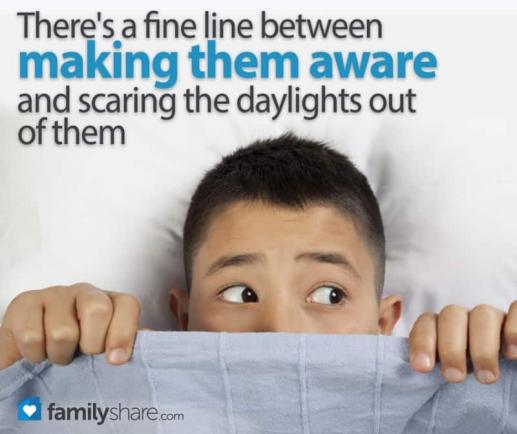
According to the National Center for Missing and Exploited Children, nearly 800,000 children are reported missing each year, which equates to about 2,000 per day.
Most caring mothers have warned their young children against talking to strangers. In these changing times when children become independent at an early age the mothers hope to instill some good sense ground rules.
But many strangers our children see are actually good people, people they'll need help from if they're in danger. "Safe strangers" are easy to recognize: police, firefighters, teachers, principals, store managers, postal workers and other mothers or fathers with children.
For parents the very best online resource is Familywatchdog, a free child predator/sex offender map where you can enter your home address and receive instant information about potential predators in your area, including photos and addresses.
But children need to know how to care for themselves when mom and dad aren't there.
Begin educating your children at an early age. They should learn that an adult offering to buy them a snack or ice cream, asking them to keep a secret, asking them for help finding a lost pet or other item, asking them to disobey their parents in any way, or offering them a ride, among other things, is not a friendly stranger. Help them to be able to find a responsible adult they can turn to for help.
Talk to your kids about the danger. Help them understand. Some parents rely on the subtle use of stories such as 'Little Red Riding Hood' to open a discussion about talking to strangers. Other good sources parents can use to enhance the discussion are "The Berenstain Bears Learn About Strangers", "The Safe Side" DVD and PollyKlaas.org.
All children should memorize their parents' phone numbers and their own home address - this information should be shared strictly by the child with a responsible adult when the child is lost. Know where your children are at all times.
Allow your children to have frequent play dates. There is safety in numbers.
The best advice is still to teach kids not to speak with someone they don't know, and if all else fails, tell them to run to safety and scream.
But there's a fine line between making them aware and scaring the daylights out of them.
In retrospect, fear of strangers made it difficult for me to make friends or develop trust in most adults. I was a withdrawn little girl who was frightened of my own teachers. I was fearful about raising my hand when I knew the correct answer. I was paralyzed and needed help expressing myself.
By the time I got to high school, I had grown out of my shell. My life was filled with social interaction. I played field hockey, belonged to a fishing club, horseback riding club, Spanish club, took piano lessons and ice skated. I also attended religious education. How could I not talk to strangers? Talking to strangers became a magical experience. It boosted my self-esteem and made me feel more confident.
Our Senior Day celebration was a special boat ride up the Hudson River. A few teachers accompanied and chaperoned us. I approached my favorite teacher, Mr. Ridout, and began a conversation.
Somehow we got on the subject of our dreams for the future. Reflecting on the past, I mentioned to him that I had somehow always counted on the kindness of strangers. He smiled and said something that has stuck with me since, "Irene, you're so right. We entrust our lives to strangers every single day. We entrust them to airline pilots, bus drivers, chefs, police, firemen, you-name-it."
Children are our hopes, dreams, our treasures, our future. Make sure you accompany them to school each day. Be on time when you pick them up from appointments, school, enrichment classes, religious education or sports events. Take good care of them, nurture and love them always. Above all, practice forgiveness when they try your patience. Give them your unconditional love and you'll receive hugs and kisses in return.

